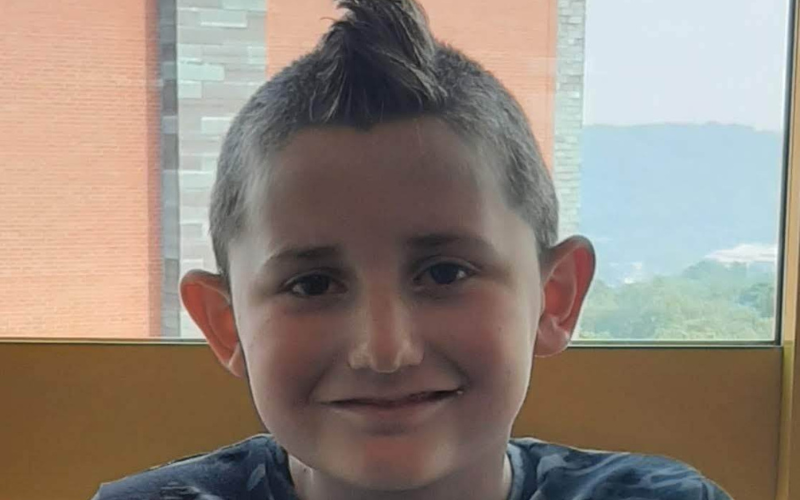
By: Trish Adkins
It has been 22 years since Alex’s Lemonade Stand Foundation (ALSF) founder, Alex Scott, held her first lemonade stand in her front yard, kicking off a movement to cure kids with cancer. Since that amazing day, supporters everywhere around the world have taken a stand for kids with cancer by hosting stands of their own, lending generous corporate support, attending special events and pushing science forward to cures for all children facing cancer.
This was another sweet year filled with amazing stories. Here are the top childhood cancer stories from 2022:
1. 10 Years of The Million Mile
Nearly 20,000 supporters raised more than $2.1 million and logged almost 900,000 miles during the 10th year of The Million Mile! Held each year in September in honor of Childhood Cancer Awareness Month, The Million Mile is more than an opportunity to walk, run or cycle. It is a reminder of the power we all have to make a difference for children facing cancer. Over 10 years, The Million Mile has raised millions of dollars to support cutting-edge childhood cancer research.
2. All Those Lemonade Stands
In June, Lemonade Days saw more than 1,100 lemonade stands held all across the United States. Supporters held stands in their front yards—just like Alex—and also hosted Grand Stands and other special events raising money to support childhood cancer research and family services, while also raising invaluable awareness of the need for more cures and safer treatments for children.
3. From Alex to Cures for All Children
This year, the Scott family learned that Alex’s neuroblastoma was driven by the ALK-mutation. They also learned that an ALSF-funded researcher, Dr. Yael Mossé, was leading a clinical trial for a treatment that was helping children who have the same type of neuroblastoma that Alex had. This brings Alex’s story full circle—showing how research works and all the hope ahead for all children facing childhood cancer.
4. Philip, Proof that Research Works
Nine-year-old Philip was diagnosed with neuroblastoma when he was just 3. Frontline treatment failed. The family turned to an experimental treatment that seemed to work, but made Philip dangerously ill. With no options, they found a clinical trial It worked. Today, Philip remains cancer-free.
5. Helping Families Through Treatment and Beyond
In 2022, Travel for Care supported nearly 350 families as they traveled to treatment. The SuperSibs program also provided hundreds of siblings with comfort and care as their brother or sister navigated treatment. As families and children recover from the short and long-term side effects of treatment, researchers, funded by ALSF, turned attention to the psychological impacts of childhood cancer. Pediatric Oncology Student Training (POST) grantee Katie Davis joined forces with mentor, Dr. Kristin Long, at Boston University to assist in developing a program for childhood cancer siblings that specifically targets symptoms of PTSD by practicing interpersonal methods of open communication in family models.
6. 5 Years of Big Data
Since 2017, the Childhood Cancer Data Lab has been a key player in the advancement of childhood cancer research. Their mission is to provide pediatric cancer experts with the knowledge, data, and tools to reach their scientific goals. ALSF’s Data Lab is celebrated five years of empowering scientists to find cures for kids with cancer, which included the launch of refine.bio. More than 5,000 datasets have been downloaded by users, and over 1.3 million data samples have been harmonized. This is data that would likely cost $1.3 billion to generate. Users can access this data for free, helping scientists everywhere accelerate research and move closer to cures.
7. Curing the Incurable with the Crazy 8 Initiative
Last year, ALSF committed funds to four Crazy 8 Initiative projects studying neuroblastoma, leukemia, brain tumors (including medulloblastoma and other high-grade gliomas), Ewing sarcoma and other pediatric sarcomas. This year, ALSF funded two additional projects focused on osteosarcoma, a common type of pediatric bone cancer for which treatments have remained unchanged for 40 years. The Crazy 8 Initiative now funds six projects at 21 institutions totaling $26 million. The aim for these projects is to tackle explicit challenges in pediatric cancer research that require substantial support for collaborative teams. Each project team uses rigorous and innovative approaches that directly address the most uncurable childhood cancers.
8. Increasing Clinical Trials
The ALSF Centers of Excellence program provides funds to support clinical trials, drug development and research at four institutions in the United States. These institutions work in collaboration to launch multisite trials, tackle the obstacles in drug development and learn more about childhood cancer. There are over 330 on-going clinical trials at the ALSF Centers of Excellence, giving families hope for cures and safer treatments.

